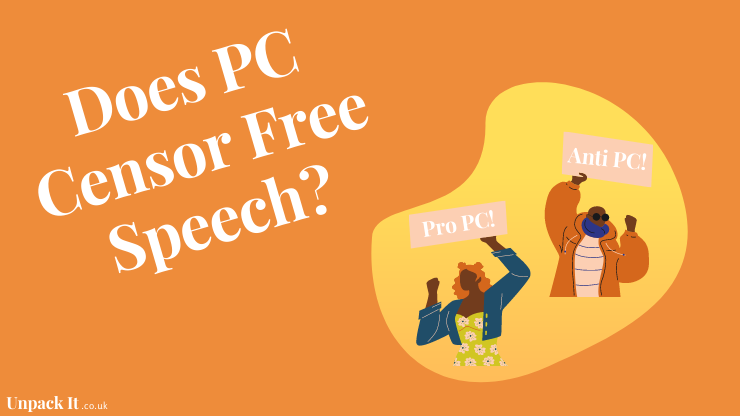In today’s society, it is often confusing whether being ‘too politically correct’ is a good or bad thing. There are many people on both sides of the debate who will passionately defend their corner. From all the noise, the true meaning of political correctness is sometimes lost. Many people think their freedom of speech is under attack by the PC culture. So are the PC Police too sensitive and taking the term too far? Or do we all need a refresher of what political correctness really means?
What is Political Correctness?
Political correctness means avoiding language or behaviours that exclude, marginalise or insult groups of people who are socially disadvantaged or discriminated against. These groups are subject to prejudice or disrespect on the basis of their gender, race, ethnicity, sexual orientation or physical disability.
A common goal of political correctness is to eliminate verbal discrimination and negative stereotyping that reinforce the subjugation of people already in a weak or vulnerable position in society. Some everyday examples that should be avoided are:
- Calling someone a cripple
- Using the word ‘gay’ as an insult
But for some people, they view these avoidances as a weakness and overly sensitive. The term politically correct is only ever used as an accusation. You would never hear anyone describe themselves as politically correct. This is usually because of the terms sly political origins.
Origins of Political Correctness
By the late 1970s, the term emerged in the west and was used sarcastically by moderate-to-liberal politicians. It referred to the stance of extreme left-wing liberals on issues that the moderates considered little importance to their causes. By the 90’s, it had gained popularity when it caught on with conservatives. They began to use the term to criticise and disapprove the teaching and advocacy of what they considered left-wing liberal ideology “gone wild” in western academia and liberal-leaning media.
Beyond mere politeness or civility, political correctness was “political” in the sense that it aimed at bringing about social change at a time when racist, sexist and homophobic attitudes found expression in everyday language and attracted no censure, even though the words were humiliating, disparaging or threatening to the minorities in question. – The Conversation
To also be interjected with “that’s politically incorrect” added to peoples critical view to PC as they felt it cut off their freedom of speech and challenged them to think about the social power of their words and the harm it can cause. Something that they were not used to. As the popularity of PC spread, so did its effectiveness to confront deep-rooted prejudices embedded in everyday words and expressions.
PC Culture
Today, PC culture is most commonly associated with movements such as gender-based bias, gay rights, and ethnic minority advocacy. Being PC is not just about sparing someone’s feelings, it’s about calling out oppressive power structures. This is often misunderstood because people are being called out on languages or behaviours that previously were never challenged. Take the programme ‘Little Britain’ for example. 15 years ago no one would have batted an eye to some of the sketches on the show. However, now it is perceived as politically incorrect. But why? What has changed?
The groups of people that it hurts the most, historically haven’t had the opportunities to have their voices heard. It was easier to turn a blind eye to such language and behaviour than to speak out and be ridiculed.
People that call out on PC culture saying ‘people are too sensitive these days’ are often in privileged positions that haven’t had to think about what they are saying and the consequences that come with it. Some people don’t want to have to change their expressions for the sake of civility and respect.
‘It’s a free country, I can say what I like’
Under the Human Rights act of 1998 “everyone has the freedom of expression” in the UK, meaning the government can’t prohibit you from expressing yourself. But freedom of expression doesn’t mean freedom from consequences.
On an interpersonal level, technically no subject is off-limits and you can talk whatever way you want. But in turn, people are allowed to respond however way they want. So for example, you have the freedom of speech to say a racist joke at work, and your boss also has the freedom to decide if they want someone that tells racists jokes to represent the company. Consequently, you get fired. You might be jobless now but at least you still have your freedom of speech!
Suggestions
Political Correctness isn’t stopping anyone’s right to express themselves. It’s mainly there to call out prejudices and act as a request for marginalised groups to be spoken about, or to, respectfully.
To say someone is ‘being too PC’ is a way to derail and dismiss conversations about inequality. Therefore, next time you’re in a situation where yourself or someone else is called out for being politically incorrect, instead of accusing them of being too sensitive, ask them to explain what was offensive or disrespectful and why, with the pure intention to listen and understand where they are coming from.
References
The Conversation – Political Correctness: Its Origins and the Backlash Against It
Thought Co. – What Is Political Correctness? Definition, Pros, and Cons
Share post



